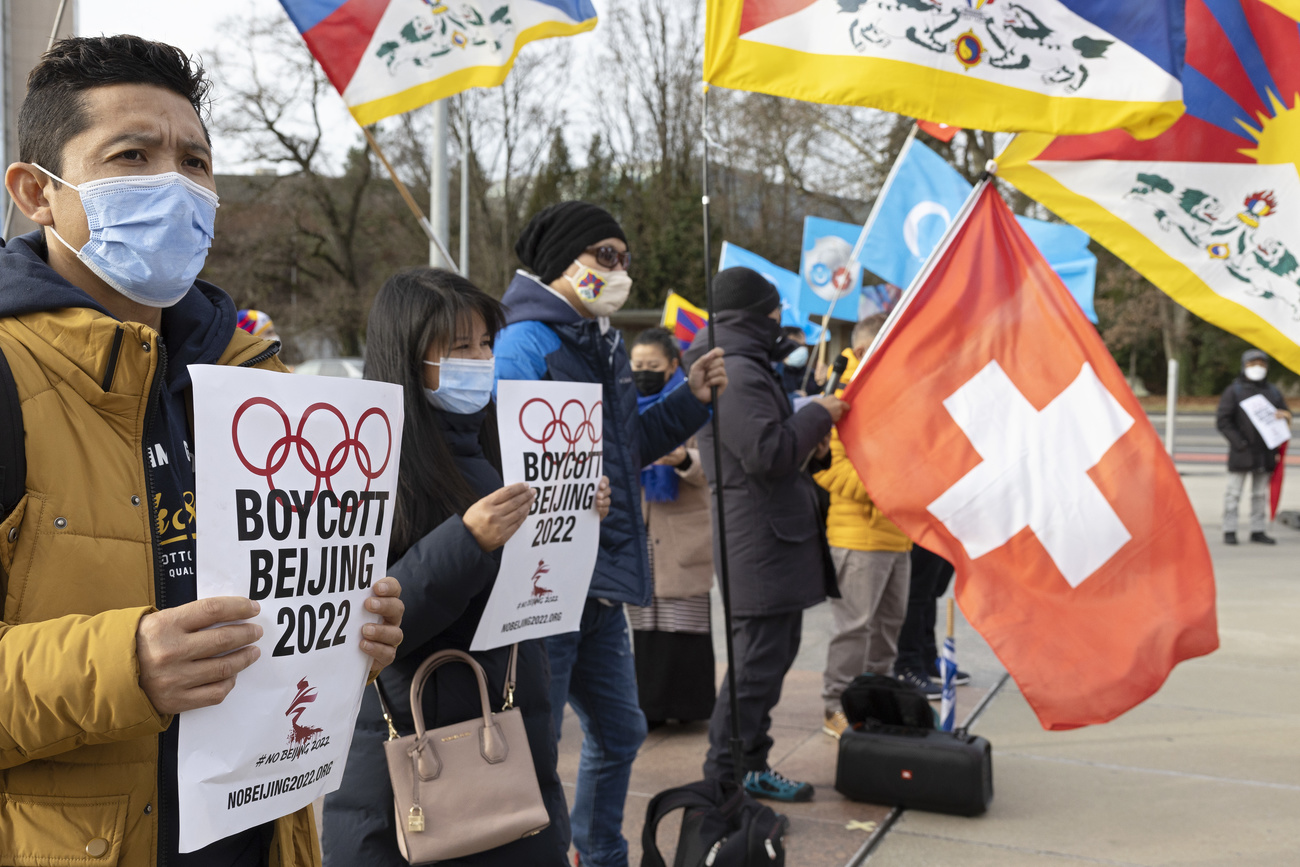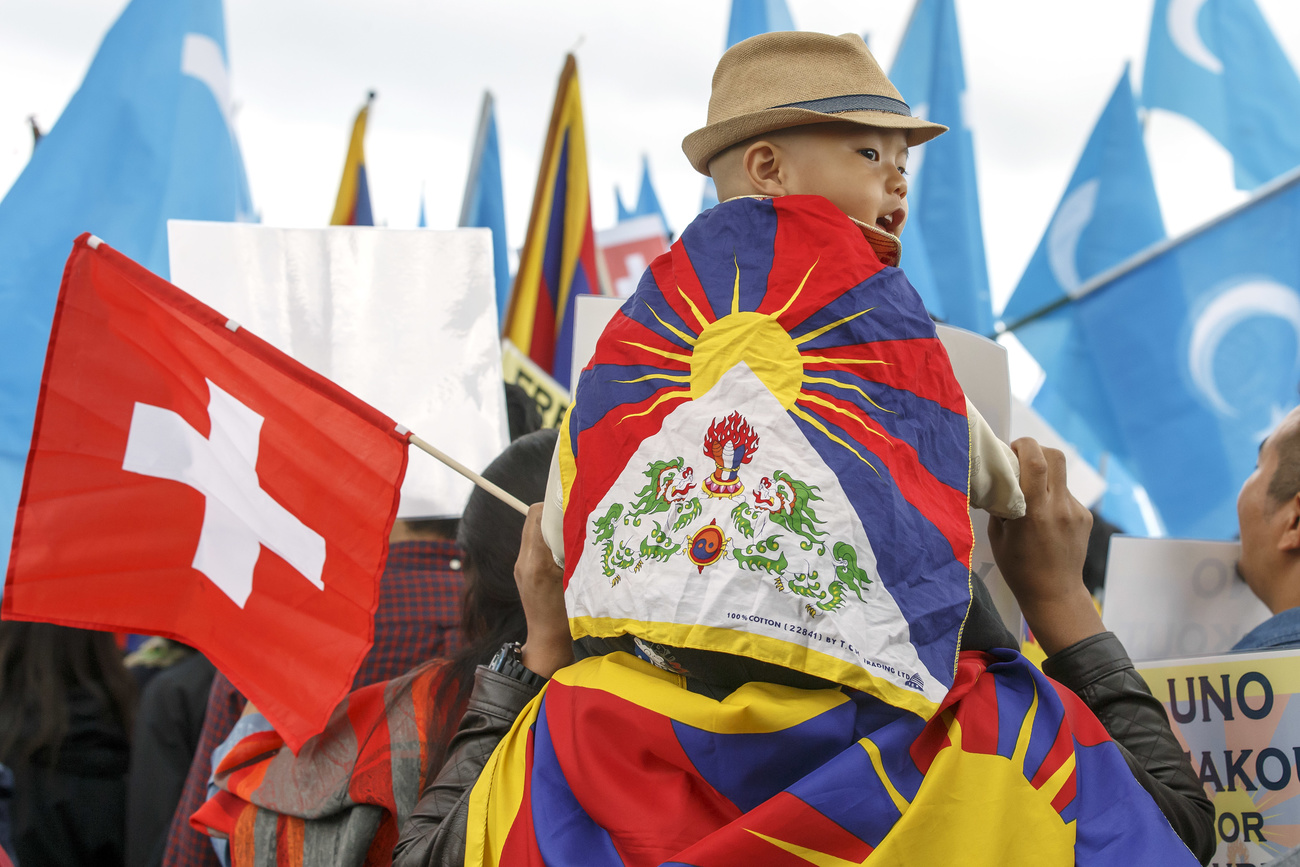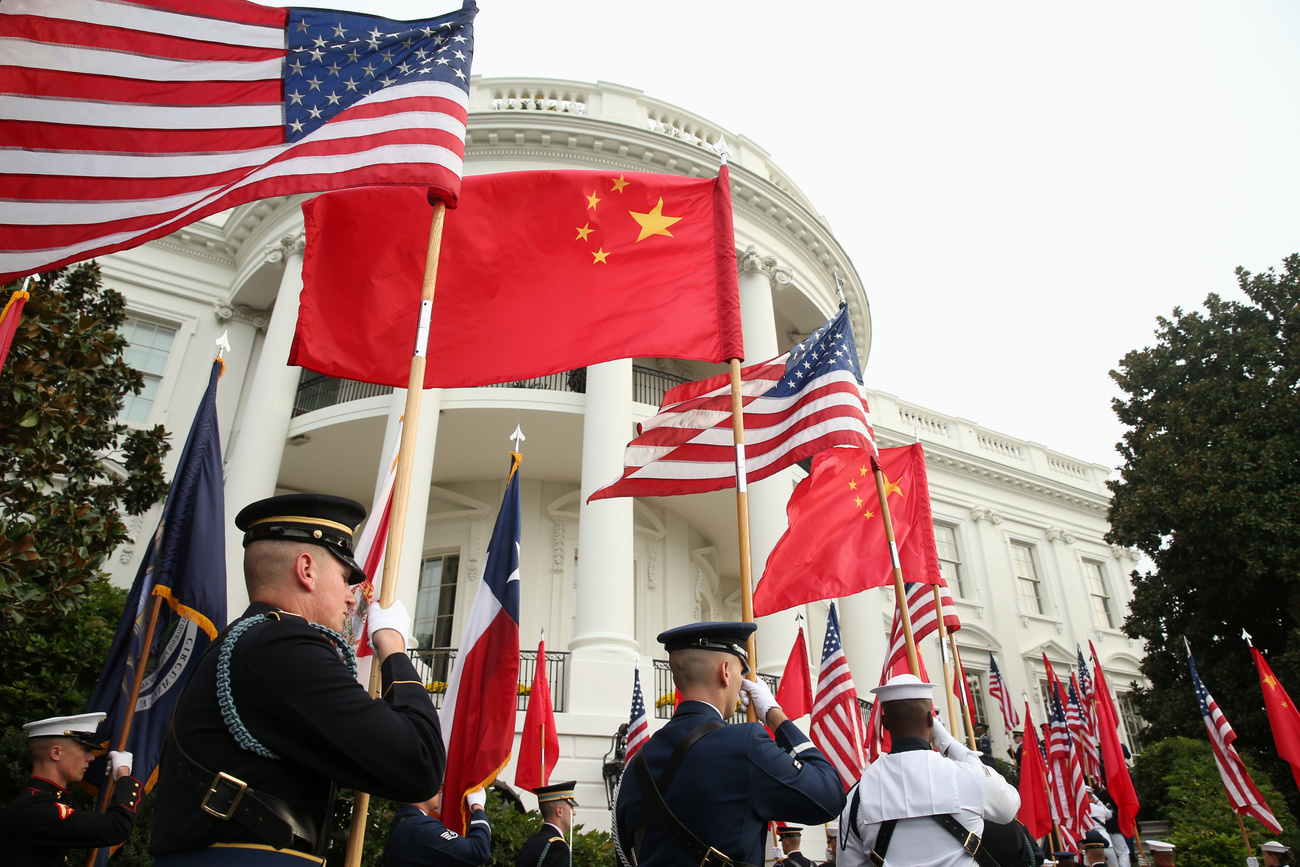How the pandemic gave Switzerland the perfect excuse to skip the Olympics

Covid-19 has provided the government a way out of choosing between a diplomatic boycott of the Beijing Winter Games and appearing at the opening ceremony on Friday. Its failure to single out China’s human rights record fits a pattern of silence on the most taboo subject in Swiss-Chinese relations.
Two months ago, Lithuania became the first country to announce a diplomatic boycott by saying it would not send its president or any minister to the Beijing Olympics, which start on February 4. The United States, Canada, Denmark, the United Kingdom, Australia, Kosovo and New Zealand soon followed, all of them citing the human rights situation in China for their decision.
Long in the making, the Swiss government’s own announcementExternal link came just nine days before the opening ceremony. No minister would go to Beijing, it said in a press release, because of the “uncertain pandemic situation” and Covid restrictions in China that would prevent “substantive bilateral meetings” with the Chinese. A spokesperson clarified at a press conference that the decision was not politically motivated.
Although there is relief among activists and parliamentarians who’ve backed a diplomatic boycott that Swiss ministers are staying home, using the pandemic as an excuse smells to them of opportunism.
Fabienne Krebs, a campaign coordinator at Swiss NGO Society for Threatened Peoples (STP), called it a “very deliberate omission” to not mention human rights. She said “substantive bilateral meetings” is a code-word for talking about human rights behind closed doors, a favoured approach of Switzerland and many other Western countries for addressing sensitive issues with China.
“At a minimum, they should have communicated that and made sure it’s understood human rights were part of the reason they are not going,” said Krebs. “It’s this silence that we’re criticising.”
The STP is among a host of NGOs and civil society groups that have urged governments to skip the Beijing Games in protest at what the groups call “an unrelenting crackdown” on rights and freedoms by President Xi Jinping. Tibetans, they allegeExternal link, have become targets of increased surveillance while in Xinjiang province millions of Uyghurs are being detained in “re-education camps”. The Chinese government has repeatedly denied claims of persecution.
Swiss ‘servility’ towards China
Since calls for a diplomatic boycott began, the Swiss government has carefully calibrated its response, choosing not to take any position on the matter. It has not ventured as far as leaders in France and Luxembourg, who have publicly stated that boycotts are ineffective. But it’s also stopped short of ever saying it was considering the option, as the US did when it revealed it was consulting allies on a common approach to the Games as early as April 2021External link.
When pressed on the issue, the Swiss government has couched its statements in vague diplomatic language.
“[Sport] in general and participating in the Olympics in particular should not be vectors of political expression,” it wrote in response to questions from parliamentarians last year.
In mid-January, the government signalled it planned to send a minister to the Games. But, it warned, this would depend on the evolution of the pandemic.
The announcement that Covid, rather than human rights, is what’s ultimately keeping the Swiss at home is a sign of the government’s “servility” towards China, said parliamentarian Fabian Molina.
“Instead of […] audibly standing up for human rights, [the government] wants to please everyone and ducks away,” said the Social Democrat, who sits on the foreign affairs committee of the House of Representatives.

More
Why critics are calling for a diplomatic boycott of the Winter Olympics
For Simona Grano, a sinologist at the University of Zurich, Switzerland’s ambiguity is part of the country’s middle-road approach to dealing with a more assertive China, Switzerland’s third-largest trading partner. This includes avoiding any action that would anger the Chinese, which the government has been at pains to do after receiving a strong rebuke from Beijing for its first China foreign policy strategy, a text published last March that criticises violations of freedoms in the country.
After the release of the strategy, Switzerland reversed course, choosing not to follow the European Union and the US in imposing sanctions on China for abuses against the Uyghurs – crimes that the US and some European countries have called a genocide. Switzerland also skipped signing a United Nations statement on the treatment of the Muslim minority.
Once countries began announcing a diplomatic boycott, China responded by saying they would “pay the price” while remaining vague on the details. In any event, Grano pointed out, many of these countries already have strained relations with China. Australia, for example, has suffered trade restrictions from Beijing for urging an inquiry into the origins of Covid-19. In Switzerland’s case, getting blacklisted by China could mean not just trade retaliation but also losing advantages built on its neutrality. The country prides itself on its good offices role hosting high-level meetings, such as the one between Chinese and American officials in Zurich last October.
Undermining international solidarity
Retaliation aside, the Swiss ministers were also likely keen to avoid any personal embarrassment with being seen applauding in the stands while the Chinese Communist Party plays up its international standing hosting one of the world’s biggest sporting events. Such an image would not have gone down well with a Swiss audience, STP’s Krebs pointed out. Public awareness of the accusations against authorities in Xinjiang has grown in the last couple of years.
More
Switzerland is hardly the only country to have struggled to find the right approach to these Games. The EU failed to agree on a common positionExternal link in January, leaving member states to make individual decisions ranging from staging a boycott to criticising the “politicisation” of the Olympics. Swedish leaders, like the Swiss, cited the pandemic for not attending the event.
Krebs fears that, by choosing to go their own way, Switzerland and others are hurting coordinated efforts to limit China’s aim of circumventing international norms.
A diplomatic boycott may not change the situation for Tibetans and Uyghurs immediately, the activist said, but it is a show of solidarity with these groups.
“We won’t get anywhere and we won’t change anything if every country is doing its own cost-and-benefit analysis,” she said. “No country is strong enough to stand alone against a China that’s undermining international human rights standards.”

In compliance with the JTI standards
More: SWI swissinfo.ch certified by the Journalism Trust Initiative















You can find an overview of ongoing debates with our journalists here . Please join us!
If you want to start a conversation about a topic raised in this article or want to report factual errors, email us at english@swissinfo.ch.